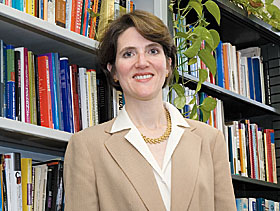  |
| HOME | THIS ISSUE | CALENDAR | GRANTS | BACK ISSUES | < BACK | NEXT > |
Human rights scholar specializes in labor, economic issuesby Sherry Fisher - December 4, 2006 |
||||
| It's not surprising that Shareen Hertel would develop a passion for human rights. "I grew up in a family that was involved in the American civil rights movement, and my grandparents lived in Iran for many years and were in charge of an international school there," says Hertel, an assistant professor of political science with a joint appointment in the Human Rights Institute. "As a college student, I lived in Bogota, Colombia, and became interested in Latin America and poverty issues - in particular, economic rights." Hertel, whose expertise is labor and economic issues, came to UConn in 2003. She worked for almost 10 years as a consultant to foundations, nongovernmental organizations, and United Nations agencies in the United States, Latin America, and South Asia. She started her doctoral degree in 1998, and graduated from Columbia University in 2003. She has lived in Venezuela, Colombia, Mexico, Jamaica, Cuba, and Bangladesh. Hertel has published a new book, Unexpected Power: Conflict and Change Among Transnational Activists, which draws on the research she conducted as a doctoral student. In it, she explores the nature of human rights campaigns in Bangladesh and Mexico through case studies of people from labor groups, corporations, and activist organizations, as well as poor workers, and academicians. She conducted more than 100 interviews. "Human rights activists in the U.S. and those in developing countries often think differently about how to address issues of economic exploitation," Hertel says. "They have different views about the nature of the problems and what should be done to address them." She says the book's title, Unexpected Power , reflects the idea that some believe that poor and oppressed people in developing countries can't articulate their rights. "Surprisingly, they find ways of getting their messages out," she says. "They have understandings of what the important rights are that are different from what we in the U.S. might anticipate." She says that in the case of child labor in Bangladesh, the U.S. will advocate removing all children from workplaces, no questions asked.
"What Bangladeshi activists will say is, 'We don't like child labor either, but you have to help us develop options for children, such as providing assistance for schooling and to families for the income they'll lose if their children don't work. If you're going to remove them from the workplace, have an alternate plan.'" Hertel also examined a situation in Mexico involving women applying for work in factories who were forced to take pregnancy tests. If they were pregnant, they would not be hired, and if already working and found to be pregnant, they were moved to the night shift or relegated to heavy work. Employers didn't want to pay the generous maternity benefits that women are entitled to under labor law in Mexico, Hertel says. "While American activists say that's blatant discrimination, which it is, Mexicans say it's also a violation of their right to work, which we in the U.S. don't think of," she says. "Constitutionally, Mexicans are guaranteed the right to work." Hertel says the situations in Bangladesh and Mexico "unexpectedly enable us to see how much richer and deeper understandings of human rights can be than our often narrow American perspectives." She is a member of the President's Committee on Corporate Responsibility, which was convened by President Philip E. Austin to help the University deal with suppliers around the world that make UConn products. "Living and working in countries where the products are made, dealing with corporations who want to prove their record, and my research on activism in developing countries, have all enabled me to help the University address particular issues," she says. "It's wonderful for people in developing countries to have the opportunity to work," she adds, "but the work needs to be decent, and it needs to be work with dignity."
|
| ADVANCE HOME UCONN HOME |

